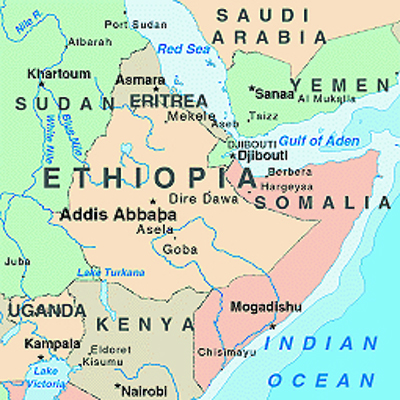Towards the Horn of Africa
Both South Sudan and Ethiopia are far from politically stable. The government in Khartoum has yet to acknowledge the peace treaty brokered in 2005 between the Arab- and Muslim-dominated north and the mainly Christian or Animist, non-Arab south. Whenever there are clashes between southern and northern soldiers, the semi-autonomous region of South Sudan worries that the national army seeks to provoke a new civil war.
In Ethiopia the political situation is similarly critical. The Ethiopian army may have retreated from Somalia, the country it invaded more than two years ago, but whether it will be able to suppress revolt by its own ethnic-Somali separatists in Ethiopia’s Ogaden region in the east, remains to be seen.
The economic situation makes both markets tough playing fields. Just consider that in South Sudan a civil war as raged for more than 20 years costing the lives of about two million people. If South Sudan’s civilians possess any skills, it’s how to hold a gun. Do they know how to operate machinery in a brewery? Now some of them do after a massive skill building effort by SABMiller.
Last year Ethiopians were left in no doubt, that their economy, once sealed in communist isolation, is part of the world system. The rise in world food prices was felt here straight away as was the rise in commodities. The construction boom in Asia has driven up the price of cement, steel and oil, with dramatic effects for Ethiopia which has been haemorrhaging foreign exchange just to keep its economy moving.
Over the past few years, Ethiopia has been having something of a boom of its own, with GDP growth rates in excess of 7 percent per year, and Addis Ababa is littered with building sites.
But a lot of these ambitious construction projects seem to have got stuck halfway. Some may have run out of cement, but others, even more of them, have probably run out of money.
That’s African economies for you. If you do business in African countries you tend to be in it for the long-term.
That’s what SABMiller must have thought when they decided to buy a mineral water company in Ethiopia. If people are willing to pay good money for mineral water, you cannot be too choosy as to what kind of beverage you fill into bottles.
Besides, what starts out as a water business might eventually lead to a fully-fledged beer business.
For years, SABMiller has been rumoured as one of the potential buyers of Ethiopia’s four state-owned breweries. Repeatedly these breweries have been put up for auction, yet they always failed to attract the sort of money the government wanted.
Finally in November 2008, SABMiller bought a majority stake in the Ambo mineral water bottling company, as part of a consortium led by the Ethiopian company South West Development Plc. The Ambo mineral water company was privatised by the government, its owner since 1963, for reportedly USD 21 million.
South West Development is jointly owned by the American businessman of Ethiopian origin, Tewodros Ashenafi, and SABMiller. Together they control 68 percent of Ambo, while the government retains a 32 percent stake, Ethiopian media reported.
The Ambo bottling plant is located 120 km to the west of the capital Addis Ababa. It was established in the 1930s and today has the capacity to produce 350,000 hl of mineral water. With 730 employees, it controls about 85 percent of Ethiopia’s mineral water market.
Ambo water is also held in high esteem by Ethiopia’s diaspora – by all accounts between 1.5 million and 2 million people who live abroad in places as far afield as Sweden, Canada and the Middle East. No wonder that SABMiller is planning to step up Ambo’s export business which will hopefully also bring in some much needed foreign exchange.
The other formerly state-owned mineral water plant, Babile Mineral Water Factory, is located 520 km east of Addis in the Harari Regional State and was sold to a local company, Petram Plc, in March 2007. Petram bought the factory for 6.5 million birr (USD 680,000 according to today’s exchange rate).
Still, the Ambo purchase leaves a lot of questions unanswered, not least the question as to the relationship between SABMiller and the Castel Group in Africa. Castel is the major brewer in Ethiopia with a self-proclaimed market share of over 50 percent. SABMiller, on the other hand, owns a stake in Castel and to date the two companies have refrained from infringing upon each other’s monopolies in Africa.
Now that SABMiller has entered the Ethiopian market, this can mean that both companies consider the market of over 70 million people large enough to justify their two-thronged approach. Or their peaceful coexistence has come to an end.
The Horn of Africa is one of the most complex and conflict-prone regions of the world. Each of the countries of the Horn – Somalia, Ethiopia, Eritrea, Djibouti, Sudan, Kenya and Uganda – suffers from protracted political strife, arising from local and national grievance, identity politics and regional inter-state rivalries. For 150 years, the Horn has also been a theatre for strategic power struggles – the British Empire’s demand to control the Red Sea, Egypt’s attempt to control the Nile, the Cold War confrontation in which each of the principal countries of the Horn switched sides at crucial junctures.
In the power configuration of the Horn, Ethiopia is the dominant player and its agenda is to isolate Eritrea, play the major role in determining a future government in Somalia and keep its access to Djibouti’s port.

